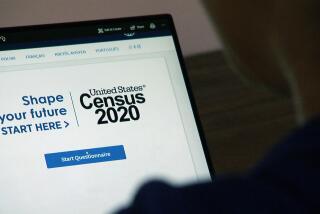Evolution of America : ’90 Census Dilemma: Too Many Questions to Ask
- Share via
WASHINGTON — Should the next census ask if you have a swimming pool in your backyard or a videocassette recorder with your television? Will you be asked to report whether you own a trash compactor or a smoke detector?
The census is still four years away, but it is not too early for Census Bureau officials to be asking themselves about what they will be asking all Americans on April 1, 1990.
What they are planning will reflect, in small but significant ways, the evolution of America.
In an aging society, census officials say they will probably seek new kinds of information on pension income and disabilities. Questions on the cost of housing and health insurance may be expanded.
Education Data
Individuals will probably be asked to give their most advanced educational degree instead of their number of years in school, a reflection of the increasing tendency to take more than four years to get a high school or college diploma. And they may have to list their food stamps and other non-cash government benefits, an increasingly important source of income.
Government planners, business marketers and scholars would be delighted to learn much more: Municipal water authorities could use information on swimming pools, for example, and educational groups would like to know where VCRs are concentrated. But the list of questions cannot go on forever, and Arthur F. Young, chief of the Census Bureau’s housing division, said: “We will be hard-pressed to include them.”
Some Will Disappear
To make way for new questions, some questions appropriate to decades past will probably disappear. Census planners may drop questions on plumbing, elevators and cooking fuel, for example, because the nation’s housing stock has improved so much that planners hardly need the data any more.
To ensure that the data collected by the census is as thorough as possible, the Census Bureau is developing special campaigns to solve two of its traditionally knottiest problems--locating hard-to-find people and persuading those with fixed addresses to fill in and mail back their census questionnaire.
Problem With Yuppies
Targets include not only the usual ones--urban blacks, illegal aliens and the homeless, for example--but also some less obvious groups, including yuppies. Howard Hogan, chief of undercount research, explained that many yuppies are “too busy” to answer the questionnaire, and “they’re never home” for follow-up visits by census enumerators.
Many welfare recipients and illegal aliens duck the census because they fear that their responses will be reported to other government agencies. Peter Bounpane, an assistant Census Bureau director, hopes community leaders will pass the word that information on individuals is kept strictly confidential.
Census Day falls on a Sunday in 1990, and census officials expect to take advantage of that coincidence by asking priests and preachers to let census employees work at their churches. “Some people--for example, illegal aliens--show up at church for sure,” Bounpane said. “We would be there after the service is over.”
Census officials promise not only to collect better data in 1990 but to make it available to its myriad users--government planners, marketing strategists and academics--more promptly.
“We started producing data from the 1980 census in early 1981 and didn’t finish until 1985,” Bounpane said. “Our intent is to finish the 1990 results by 1993.”
Biggest Obstacle
The greatest obstacle to speed has been the comparison of city populations with what they would have been 10 years earlier if current city boundaries had been in place then. Bounpane said improved automation will make such comparisons much easier.
Once again for 1990, the Census Bureau is planning two questionnaires--a long one that will be sent to about 20% of the population and a shorter one for everybody else. The goal is to have people spend no longer than 15 minutes on the short form and 45 minutes on the long one--and that strictly limits the number of questions.
A disability question previously limited to the impact on employment will probably ask whether individuals are limited in gaining an education, attending to personal needs and getting around the home. Census Bureau population specialist Paula Schneider said such data is needed to plan special education classes for children and social services for the elderly.
Information on educational degrees would meet a similar need. “Some federal programs that deal specifically with high school dropouts and people holding various degrees need better data,” said Paul Siegel, the Census Bureau’s chief education statistician.
Space Problems
Social scientists who measure the extent of job discrimination and the effectiveness of education programs are upset over the need to choose, but census officials say they cannot afford to include both questions on the 1990 census. “Space problems,” Schneider explained.
Pension income, which was lumped with various other income in a 1980 question, probably will be split out in 1990. “Because the population is getting older,” Schneider said, “the Treasury Department is interested in that one for reviewing tax policy and the Department of Health and Human Services for studying the elderly’s income needs.”
In the housing area, a 1980 question on what owners of single-family houses pay for mortgages, taxes, insurance and utilities may be extended to owners of condominiums and mobile homes. “The costs for the two groups probably differ,” Young said, and that would interest both builders and government planners.
More to Read
Sign up for Essential California
The most important California stories and recommendations in your inbox every morning.
You may occasionally receive promotional content from the Los Angeles Times.













